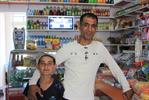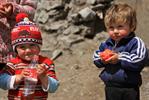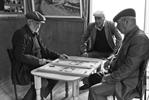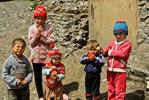Daily life in Azerbaijan is not significantly different from that in other former Russian republics. Day after day is filled with the basic necessities of living. Work can be hard to find, so when money does come into the household, it usually is spent on necessities. During leisure time, the family members enjoy simple pleasures such as sporting events, good cooking, and talking with friends and family.
Life revolves around a web of family connections and commitments. Bosses will be totally understanding of any employee who is absent due to a funeral, engagement or wedding of even a very distant cousin. And again the next week. Finding a job for a relative is considered an obligation rather than nepotism and clan solidarity is often more important than pure politics at upper levels of society. Especially in Baku, women appear very liberated, with their bright make-up and high heels, but in reality Azerbaijan remains very much a maledominated society.
It's unquestioned that a wife should have food on the table whenever her husband appears. And no local woman would consider drinking tea at one of the chayxanas, where many of her male relatives might be happily gossiping and playing nard. The lack of any genuinely free press adds to the extraordinary undercurrents of rumour and misinformation that circulate.
Local girls in Baku, although they dress rather provocatively, are really very conservative by Western standards. Many of them are not allowed to "hang-out" with boys. And curfews, imposed by protective fathers, are the norm. It was a challenge to relate to the men here. While there is a growing number of well-travelled people, many people have never let Azerbaijan, or even gone to the regions.
Life in the city - Many Baku men are employed in oil-related sectors. Some may spend weeks away from home. Either way, the work is physically demanding. Although some Azerbaijani have been moved into white-collar positions such as technicians, most still work the blue-collar jobs while the foreign oil companies bring in their own engineers and other experts. Many also are unemployed. If this is the case, the father of the family likely spends many hours at a local teahouse, talking to friends about which companies are looking for workers and what he must do to get a job. He likely takes on daily jobs just to bring in some money. He might drive a taxi for a day, help out at an oil-processing plant, or work as a day laborer at a farm outside the city.
The mother will take care of the small household; most city-dwelling families are small because housing is difficult to find and unemployment is high. The family probably lives in a Soviet-era apartment that looks just like thousands of other apartments in the city. The elevator is likely in need of repair so, if the family lives on a top floor, mother will haul laundry and groceries up several flights of stairs.
Grandmother and grandfather probably live with the family as a way to save money because their pension checks are small, if they get them at all. Grandfather will head out around midday to meet friends in the local park, where he will smoke cigarettes, play chess, and generally criticize the government’s handling of the economy and the fight with Armenia over Nagorno-Karabakh. If asked, he will pick up some fresh bread or green vegetables on the way home in the afternoon. Grandmother will help with the housework and will baby-sit any children while mother runs errands, such as picking up the day’s groceries or searching the various markets for silk and cotton fabric that she can sew into clothing. Grandmother also will do much of the cooking, relying on a menu of meals that she grew up with. Keeping up the household is not an easy venture for mother. Because the city water is undrinkable, all water must be boiled. The family probably does not have hot water for bathing, so baths happen only occasionally and then the water must be heated on the stove first. Electricity is sporadic, so mother must make sure that any activities requiring electricity, such as sewing, are kept up to date.
The refrigerator probably runs on natural gas so that it will stay running when the electricity is shut off. There are no luxury appliances, such as microwave ovens. Because the family is Muslim, they celebrate many of the Islamic holy days, including Gourban Bayram. This Festival of Sacrifice commemorates Abraham’s test of faith when God ordered him to sacrifice his son Isaac. People visit family and friends during the five-day festival and the head of the household slaughters a sheep, which is used as the central meat for the upcoming feast. Since Azerbaijani people often are not practicing Muslims, they may use this time to visit family and friends and hold large feasts, although they likely will serve dishes made of store-bought mutton. The next festival is Novruz Bayram. This New Year festival is rooted in Zoroastrian tradition and marks the return of spring. It is a time for parties, picnics, and family reunions. Children receive presents at this time, and both mother and grandmother will do spring house cleaning.
Asura is a Shi’ite holy day that commemorates the martyrdom of Imam Hussein, grandson of the Prophet Muhammad, at the battle of Karbala in A.D. 680. Men will parade through the streets dressed in black, hitting themselves with metal flails while virtually every community holds a passion play that reenacts Hussein’s murder. Father probably does not participate in this, although the family may venture to see one of the passion plays.
During the holy month of Ramadan, devout Muslims refrain from eating, drinking, and smoking during daylight hours. It ends with a three-day festival of eating and drinking. Most Azerbaijani people are not devout Muslims, so they do not fast through the entire month. Some will cut back by eating smaller meals and not smoking or drinking alcohol. Whether the family actively participates in these events or not, they will be aware of them and observe their neighbors’ rights to participate in them. They will be respectful of the fact that restaurants and markets may be closed during daylight hours during Ramadan, for example.
The children in the cities attend school from the time they are five years old until they are about 18 years old. At that point, the boys must serve in the army for two years. Most of the young men will be used to back up the peacekeeping forces in Nagorno-Karabakh but will never actually be sent to the region. The schools still run on the Soviet model, so boys and girls attend classes together. They learn math, science, history, social studies, the Azerbaijani language, and Russian. After school, boys and girls alike may participate in a chess club, a wrestling team, or a soccer team. Children who do not do exceptionally well in school will be routed to technical schools by the time they are about 13. Here they will learn a trade, such as working on oil rigs or at oil-processing plants. The children who pass their preliminary exams will work hard at school and on homework so that they pass their exams when they are 17 and 18. If they pass with high marks in four or more subjects, the boys may forego the army to attend college, although they will later be expected to serve the army in their professions. The girls can go directly to college or technical schools, although, because of the Muslim tradition, many will simply work at retail or secretarial jobs until they marry and start families.
The family cannot afford to attend the opera or ballet when it comes to town, but the adults do make excursions to local clubs to hear American-style jazz as well as Azerbaijani music. Traveling musicians also frequently play in the park for free.
Life in the country - can seem very different from that in the city. The family almost certainly lives on a farm. Because most of the farms were bought back from the government when the privatization program began, the family may own anywhere from 10 to 100 acres of land that it manages itself. It also may have bought a larger farm by joining with other family members. The house is small but larger than the city apartments. As in the city, grandmother and grandfather likely live with the family. Unmarried aunts and uncles also likely live in the household to help with the house and family chores before they go on to start their own lives. Living on a farm means constant work for everyone, including the children. Mother may be responsible for small animals such as chickens, while father tends the beef cattle or sheep. If the family raises fruits and vegetables, father tends to the plants while mother and grandmother keep a large kitchen garden near the house.
Farming communities maintain the Soviet style, where households surround a small market area. The fields then radiate from that central area. The children have just a short distance to walk to school, and mother or grandmother has just a short distance to go to purchase essentials. Father will go into the market area perhaps once a week to visit with his friends and discuss buying a new plow or a large tractor as a community.
Grandmother may never leave the house. She will care for the young children, tend the garden, cook meals, clean house, and generally back up mother for all the work that must be done. Mother is very frustrated when she goes to the market because there are very few goods available in the stores. The old distribution methods have broken down, so even basic items such as cloth are difficult to obtain. Meals in the countryside are not as elaborate as those in the city, and they often are much larger. Instead of intricately spiced sauces, the lamb will be simply cooked over an open flame. Desserts will almost always be simple fruit that is in season in the family’s garden. After they get home from school and do their farming chores—such as feeding the young lambs—the children may gather with nearby friends for a quick soccer match or game of chess.
The people in the country probably have some electricity but it may be just one simple outlet that works only a few hours a day. It might be located on a large pole outside the house, so long extension cords will be attached to a single light. They may have a battery-operated radio to receive news and to listen to music, but it will be used for only an hour or so each night so the batteries do not wear out quickly.
Whether living in the city or the country, the people of Azerbaijan are anxious for change. They watch the government closely and read newspapers whenever they have a chance. They are looking toward a more affluent future and have little patience left for a government that is not taking them in that direction. As a result, all the adults are likely to talk politics often and may even go to political meetings in the evenings.
What Grandma likes to cook?! - Food is a very important part of life in Azerbaijan and, because the country has ample farmland, it is relatively inexpensive. Grandmother will start the day’s main evening meal with a plate of aromatic green leaves and bread. She may serve yogurt or cheese, and a cucumber and tomato salad. The main dish will probably contain fish or lamb. The meat is often skewered and grilled as a kebab then served with a sourplum sauce or a sweet cucumber and onion sauce. If she has obtained chicken, she may make lavengi, a casserole of chicken stuffed with walnuts and herbs.
For lunch, grandmother will again prepare bread and salad, but this meal will have soup instead of a main dish. Dovga, a thick soup with yogurt, rice, spinach, and fennel, is a favorite. Another favorite is Dusbara, small lamb-stuffed dumplings served in a meat broth. She probably made qutab the night before so it could be sent with father for lunch. This dish is a type of pancake turnover stuffed with minced lamb, cheese, or spinach. Grandmother will spend a great deal of her day making an elaborate dessert, especially if friends or other family members are visiting. Baklava and halva are typical desserts. Both feature chopped nuts sandwiched between thin layers of dough. For special events, she also will make pesmak for the children. These tube-shaped candies are made from rice, flour, and sugar.
If you're planning a trip to Azerbaijan: Check The latest information of visa regime in Azerbaijan. Please do not hesitate to contact us for consultation.









